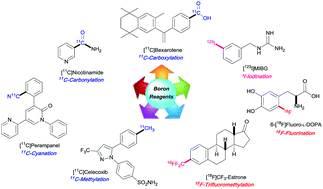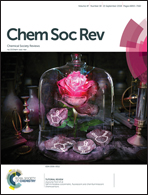Boron reagents for divergent radiochemistry
Abstract
Radiolabelled (bio)molecules have advanced many areas of science from fundamental biology to human health including applications in molecular imaging and more generally nuclear medicine. Today, the field of radiochemistry is rapidly expanding, a trend resulting from the increasing demand for labelled molecules necessary for diagnosis and to accelerate pharmaceutical drug development. More often, the synthesis of labelled (bio)molecules employs a pre-functionalised precursor to allow for the chemoselective installation of a particular radioisotope-containing substituent. Among the array of precursors available, boron reagents occupy a prominent place because they are easy to handle, numerous possibilities exist for their preparation, and their reactivity has been well studied especially in cross-coupling chemistry. In this review, we discuss the value of boron-based precursors for the radiolabelling of (bio)molecules with the radionuclides carbon-11, fluorine-18, iodine-123, iodine-125 and iodine-131, and we illustrate how these radiosynthetic advances have opened the radiochemical space available for areas such as PET and SPECT imaging.



 Please wait while we load your content...
Please wait while we load your content...